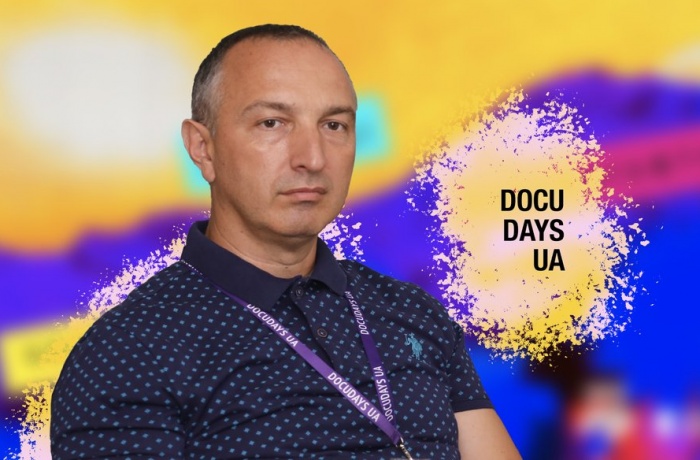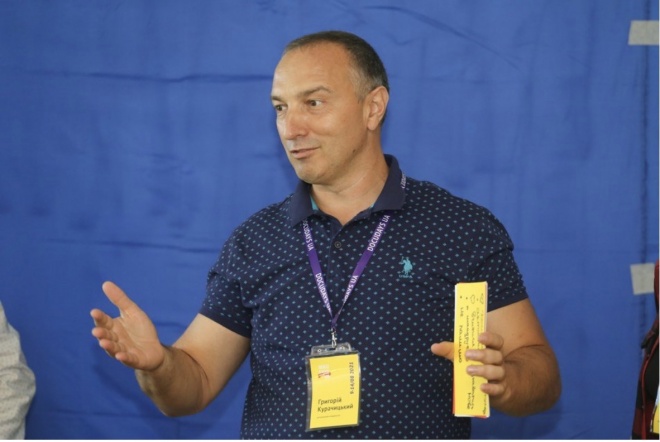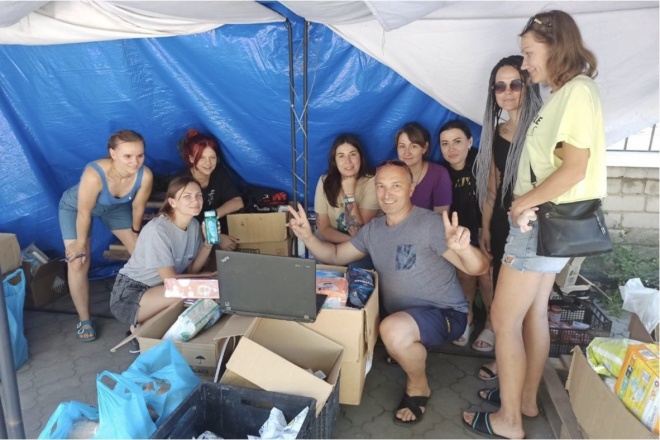Hryhoriy Kurachytskyi: “Not just ‘about cinema’”
Hryhoriy Kurachytskyi: “Not just ‘about cinema’”

What helps Ukrainians to stop tanks with their bare hands? To fundraise millions for Bayraktar drones? The Travelling Docudays UA and Suspilne Culture have prepared ten stories about the resilience of Ukrainians which will help us find answers to these questions. This text is a conversation with Hryhoriy Kurachytskyi, a regional coordinator of the Travelling Docudays UA, about his escape from Mariupol and organisation of film clubs in cities and towns near the frontline.
Hryhoriy Kurachytskyi is the regional coordinator of the Travelling Docudays UA International Human Rights Documentary Film Festival in Donetsk Region, Chairman of the Board of NGO Pryazovska Human Rights Group. Hryhoriy has been working with NGO Docudays since 2014; over the years, he has organised 8 Travelling Docudays UA festivals and a DOCU/Club in Mariupol. When his home in Mariupol was destroyed after Russia’s full-scale invasion, he left for Dnipro with his family.
NOT JUST ABOUT CINEMA
I am a lawyer, I have worked in the civil society sector since 2012—back then I was a legal consultant at the Future Club charity. And I got my first experience of working with NGO Docudays a year later with Oleksandr Bukalov, head of the Donetsk Memorial organisation, who was already a regional coordinator for the Travelling Docudays UA back then. He proposed to screen a documentary at a women’s correctional facility where I provided legal consulting to the inmates. At first I was sceptical: “Who needs those films?” But I did agree to help organise the first screening. Everyone really liked the film, and I left my scepticism behind. I recall that we discussed it for a long time afterwards…
Some time later, I was able to attend the March Docudays UA festival in Kyiv. I was struck by the atmosphere, creativity, the events! At that point it was clear to me that these people were not just “about cinema.” And I wanted to join the team.
In 2015, I founded the NGO Pryazovska Human Rights Group; the same year, I became a regional coordinator of the Travelling Docudays UA festival. There were some funny situations for sure! Back then I knew very little about documentaries, but I really liked them, so I decided right then that I would make a film for Docudays about how I was conducting the festival. I took a regular VHS camera, titled the film On Human Rights Under Cannons, and started filming the screenings and other events in various regions. Phew, the filming is done! I come up to my colleagues and say in this confident tone: “We should screen it at the festival!” Now I laugh at it! Yes, that happened, too…
Organising the Travelling Festival was a difficult task at first. Because officials didn’t want to provide locations, premises, and screening permits in a city near the frontline just like that. They kept demanding official letters. We wrote like a dozen of them! We constantly needed to explain that human rights documentaries are not something against the current government, that we, on the contrary, were offering to do something useful for the community together with the city. In the end we did find a common ground.

Photo from Hryhoriy Kurachytskyi’s archive
I organised the first screenings at education institutions, but eventually I wanted to expand the audience, so we started working with correctional facilities. Then the police got interested in festival films, they invited us to hold events there. Later there was interest at Probation Centres. And so, step by step, the number of festival locations was growing every year.
It’s not easy to work in a city near the frontline: there are several military bases, border guards, National Guard. And you have to reach everyone, explain what the films are about, so they can let you into a secure facility. I recall some commanders saying that soldiers didn’t need any rights, only duties. They watched us, listened… and then accepted us. One screening was even attended by a general who used to be the head of the Donetsk National Police. All kinds of people.
By the way, one of the servicemen became so interested in documentaries that he began to make amateur films after he was discharged.
I also remember how in 2016 we showed the film 10 Seconds about bombings of Mariupol. There were always different political views in Mariupol, there various statements in the film about the events at the Maidan and in the region. We even had a misunderstanding with some viewers because of this film. For a while we debated with the administration of the city where we held the screening. The filmmaker showed it as it was and did not remove documentary footage. Then, of course, we reached an understanding. There were all kinds of things.
The Travelling Festival only takes place in autumn, but there’s constant demand for films from the Docudays UA programme. So last year our organisation registered a Docudays UA film club. We decided to show films all year, without limitations. We held about 20 online and offline screenings in 2020, attended by about 200 viewers.
YOU CAN GET USED TO BOMBINGS
They started bombing Mariupol from 24 February. So from the first day of the war and until 11 March, my family and I were hiding from shelling and bombing in the basement. Some people left as soon as bombings stated, some could not make themselves leave. Our parents weren’t letting us leave, they were afraid we would be shot. We decided that if we don’t freeze, then we’ll take whatever happens.
On the first days of March, there was no power, water, or gas anywhere; but there was less shelling at our parents’ place outside the city, so we moved to live with them. In the basement. Over time you get used to shelling, but you can’t get used to the cold. The spring turned out to be impossibly cold. The temperature was never above zero, and it was often just freezing. It was impossible to fall asleep because of the cold, we only got short naps scattered through the night.
We had some food stored, potatoes, but too little flour. I learned to make dough cakes and fry them on a fire, it produced decent bread, actually. You mix flour, water and bread, then you make cakes and put them on fire in a frying pan right away. At first it’s not that good, but then you get used to it, it’s OK.
We heated water on a fire, which made it stink horribly of burned stuff. We couldn’t drink this horrible drink made of soot.
My wife and I have two kids: Anastasia is 19, Rostyslav is 9. Nastia has a heart condition, so it was one of the reasons for our decision to leave. It wasn’t getting any warmer outside, we started running out of candles, there was less and less power; fortunately, we had some medicine stockpiled under occupation, but where would we get the medicine later? The kids were freezing from the cold and falling ill. We had no choice, we had to leave.
There was no connection, but I had a phone which I charged in the car and headphones which acted as an antenna. You raise the wire a little higher and you get Russian radio, and 20 centimetres lower you can catch Ukrainian radio. In the morning of 10 March I heard on the radio that Zelensky supposedly said there was some kind of corridor. Then I met some friends, we decided to take a risk and left on the same day. We moved in a column of seven cars, adults, children, we all knew each other. To spend less fuel, which was in shortage, and draw less attention, I left my bigger car and took a small, unnoticeable car from my relatives. We finally warmed up at least a bit in the car.
WE FELT LIKE WE WERE IN A JUNGLE
Along the way we were constantly stopped at checkpoints, our papers were checked. There was a tank in the middle of one of the roads, and suddenly it fired! My son, who was sitting in the back seat, was very scared.
Later we found out that we weren’t even checked as much as the people who left after us. By that time they had already started looking for military men at checkpoints.
We actually didn’t know where we were going, we had no cell connection, we just packed up and left. At the checkpoints they kept asking, “Where are you going? You’re going to return to Mariupol soon anyway.”
I found out that my house was reduced to rubble only when we were about 15 kilometres away from home, under shelling. My neighbour called me: “A bomb fell near your garage. Your house burned up completely, the garage gate smashed into the back wall!”
We called everyone we knew along the way, but some had already left Ukraine, and others just did not want to host us. Only a woman we met accidentally gave us shelter. A few years ago my daughter had heart surgery, and a woman was with her in the same hospital room. After the tenth or twelfth rejection, my wife remembered her, she was from Zaporizhia. We called her, she let us in, we spent the night. Then we drove on to Dnipro, and the city there was completely different. No checkpoints which we had gotten used to. Regular peaceful life. Dnipro accepted us, so we live here for now.
In general, during the entire period of occupation and escape from there we felt a very atypical fear, it did not leave us even for a minute. I think it was probably similar to the fear you feel in the jungle: you don’t know where an attack can come and when, you don’t feel safe anywhere. My daughter still flinches when she hears thunder.
PEOPLE FLEEING HELL DON’T NEED A LOT
My family and I barely took anything with us. Back then we thought we’d go back and collect everything. We didn’t even have clothes. I just left in sweatpants.
We got help with adapting to life in Dnipro from Mariupolians who had arrived there earlier. They founded the hub called Good Morning, We’re from Mariupol, where people could receive all kinds of humanitarian aid. And people fleeing hell actually don’t need a lot. After all this, we value very simple things. And big desires, plans and dreams will probably appear after the war, when we return home.
From the first days in Dnipro I helped people like me. I unloaded trucks with humanitarian aid, every day we welcomed up to 300 families from hotspots. People came to get some food, and received it, but they weren’t in a hurry to leave. From conversations with these people I realised that they really needed communication. An honest conversation, an understanding that you are not alone helps us not to lose the eagerness to live and feel like we are understood. People now just need to feel that they belong to a community, have someone to tell their story to, to experience shared pain, to get a hope for the future.
From the experience of the Travelling Festival and our film club in Mariupol, I know that documentary films and conversations after them bring people together, support them, and give them the strength to live, believe and hope. So later in Dnipro I organised the first film screening for displaced people in a tent. I made benches from ordinary trays, set up a laptop, speakers… People like it, they come, watch good films, talk, wait for new films.

Photo from Hryhoriy Kurachytskyi’s archive
Another hub I’m involved in, Little Mariupol, was also organised by Mariupolians. Little Mariupol has two rooms and a coffee shop whose owners are also from Mariupol. And at this centre we also hold film screenings. 98% of the people who attend the events are internally displaced. There are also exhibitions of paintings, an auction to help IDPs, meetings, various events, and a psychologist is also involved.
I recently organised a screening for Dnipro residents, we watched the film Jamala’s Struggle. Every time I host an event, I first ask: “Do you know what Docudays is?” If they don’t, I introduce them to it, tell them about the festival in Kyiv, about the Travelling Festival, about documentaries, about human rights.
In summer, we watched the documentary Alphabet with displaced children. After the screening we discussed the events from the film for a while and compared them to our lives in basements. We sympathised with the film’s protagonist who did not have a chance to learn how to read and started going to school with her daughter. We spoke about how we should never give up but learn how to overcome obstacles. I listened to the children and felt that working with them right now is incredibly important, they really need honest conversations with us about real values, about the strength of character, about the victory and about the future.
Recorded by Khrystyna Bilyakovska